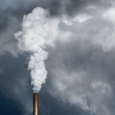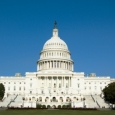Clean Air
Air pollution has long been one of the most significant negative impacts of industrial society. Smoggy cities lead to increased asthma rates and carbon emissions currently threaten the global environment. Under the Clean Air Act, and its various amendments, the Environmental Protection Agency is empowered to regulate American industry to minimize or eliminate the dangers posed by airborne contaminants. In 1990, Congress set up a cap-and-trade program to deal with emissions that caused acid rain and ozone depletion. It is a striking success.
Commentary
Republicans Can't Name A Single "Job Killer" Regulation
Cry Wolf Quotes
We just don't have the technology to comply [with Clean Air Act regulations]….[not even with] technology on the horizon.
Initiatives such as the acid rain legislation would, in this respect, achieve only the dubious distinction of moving the United States towards the status of a second-class industrial power by the end of the century.
But the governors of Connecticut, Delaware, Maine, New Hampshire, New Jersey, New York and Vermont are still in the compact, ready to impose a heavy economic burden on their citizens.
[We are] certain [that] the large installed inventory which we depend upon in this country cannot survive. … We will see shutdowns of refrigeration equipment in supermarkets. … We will see shutdowns of chiller machines, which cool our large office buildings, our hotels, and hospitals.
Related Laws and Rules
Evidence
-
EPA: “Benefits and Costs of the Clean Air Act: Second Prospective Study—1990-2020”
Clean Air Act benefits total more than $2 trillion.
-
Industry Opposition to Government Regulation
The real costs of specific regulations, in chart form.
-
The Going-Out-Of-Business Myth
OMB Watch debunks the cry wolf claims made against specific regulations, in chart form.
-
Jobs vs. The Environment: An Industry-Level Study
Four industries that operate under intense environmental regulatory scrutiny, but haven't lost jobs as a result.
-
Benefits and Costs of the Clean Air Act - 1990 to 2010
The monetizable benefits of the Clean Air Act are four times greater than the costs.
Backgrounders & Briefs
Good Rules: Ten Stories Of Successful Regulation
Demos looks at ten laws and rules that we take for granted.
The Secret History of Lead
This immense article is an intricately detailed history of leaded gasoline, from the industry's early cover-ups to their attempts to defeat EPA regulations.
The Removal of Lead From Gasoline: Historical and Personal Reflections
First-person historical analysis of the leaded gasoline fight.
Resources
Political Economy Research Institute is a think tank focused on a variety of subjects such as diverse financial regulation, living wages and environmental protection.
National Highway Traffic Safety Administration is the agency that oversees auto and highway safety regulations, auto recalls, and CAFE standards.
Blue Green Alliance is an alliance of labor and environmental organizations.
Green for All is a leading environmental oranization focused on creating green jobs for low-income communities and people of color.




